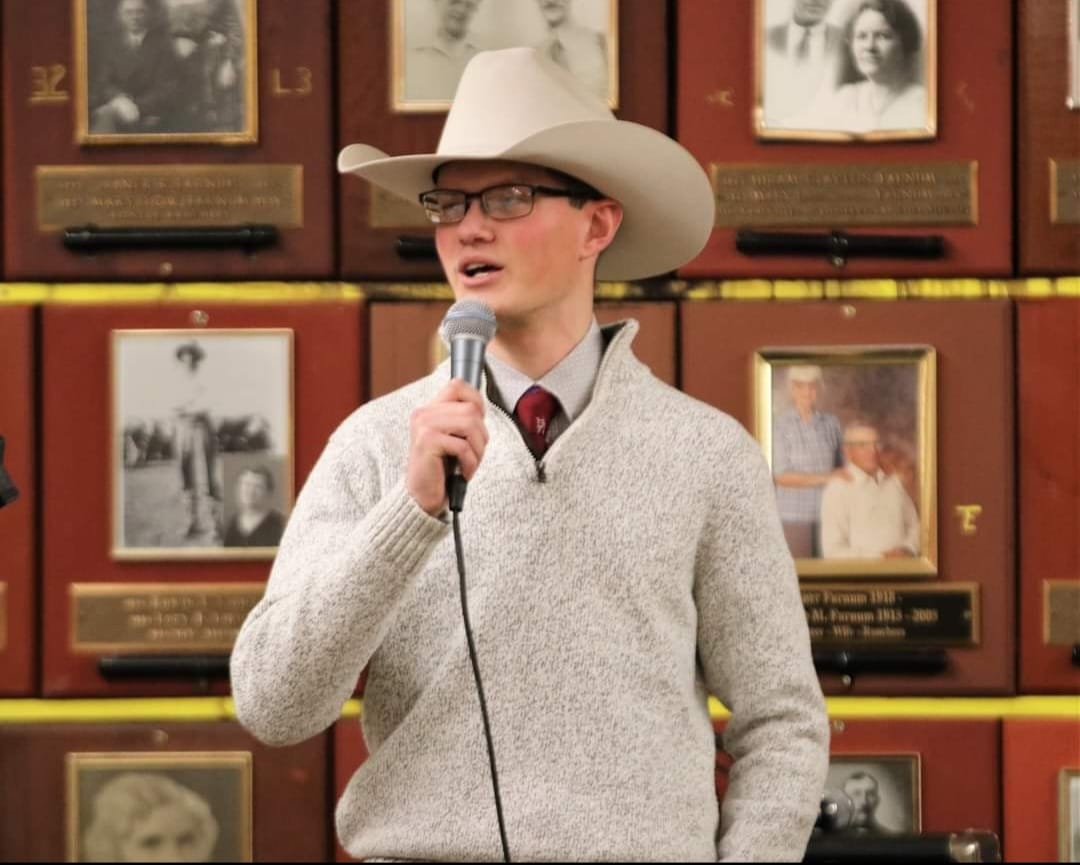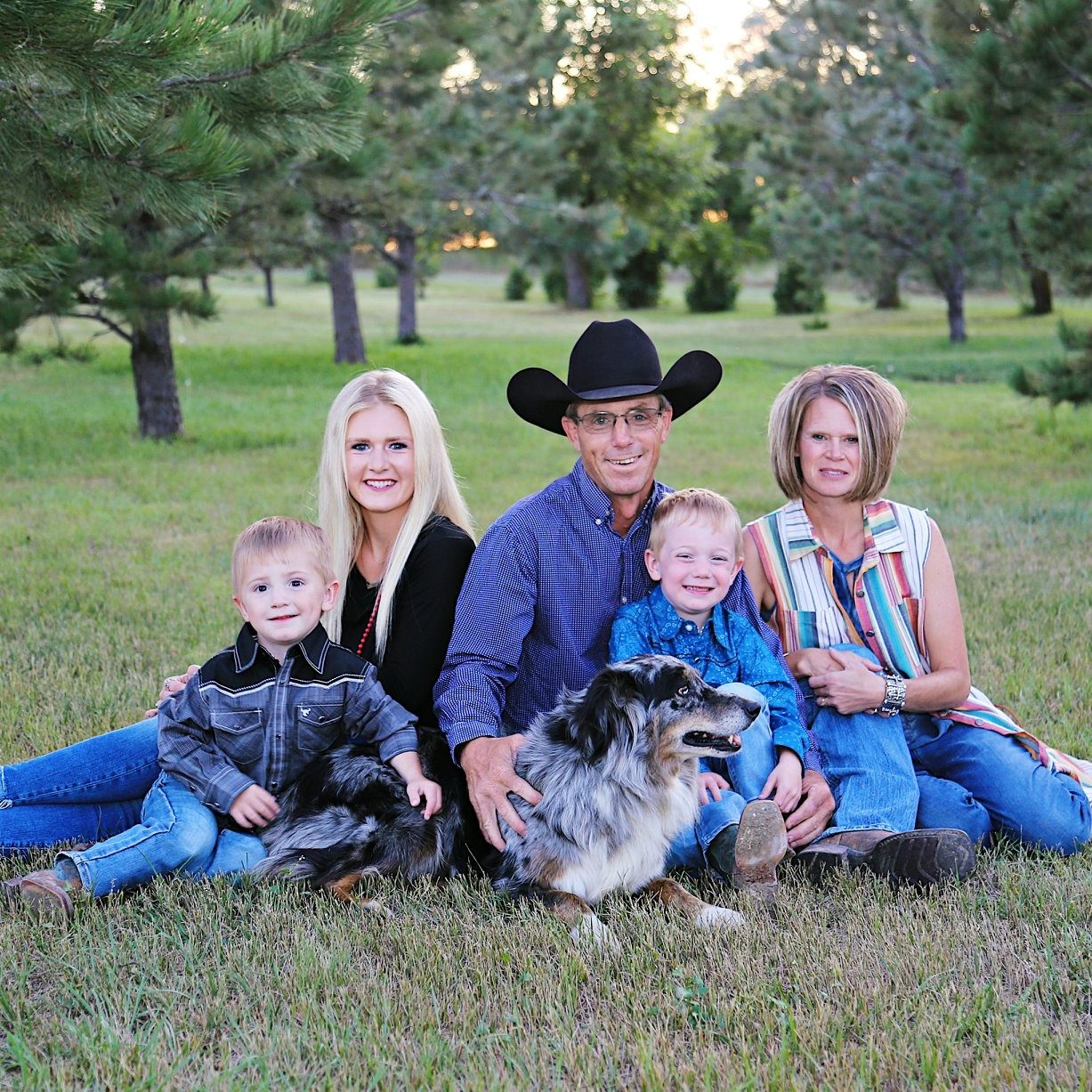The Art of Cowboy Rhythm

Carson Houser [Photo: submitted]
Cowboy Poetry is an art of colorful highlight reels of the lifestyle a cowboy leads. The vivid tales explore the experiences and interactions through a broad array of topics connected to the cowboy life; ranch work, brandings, cow dogs, horses, livestock, rodeo, western landscapes, etc.
Cowboy Poetry was cultivated on the cattle drives in the early 19th century. The trips lasted many months covering hundreds of miles. At the end of a grueling day, cowboys would gather in the evenings around a crackling campfire to recount the stories of the day. These stories found a rhythm of its own, becoming a collection of cowboy history.
Leaving his mark in cowboy history is Carson Houser of McClusky, N.D. Houser is sharing his perspective of the cowboy lifestyle through the art of Cowboy Poetry as he furthers his education at South Dakota State University.
Let’s learn more about this legend in the making:
What prompted you to pick up a pencil and start jotting down cowboy rhymes?
Growing up, I was familiar with cowboy poetry but had never heard it performed live. During my senior year of high school, I had the opportunity to see Rodney Nelson perform cowboy poetry. It inspired me to try my hand at writing, which led to the completion of my first poem a few months later. I began to study the craft more, teaching myself to write and revise as I developed into a cowboy poet.
Currently you are riding bulls for SDSU College Rodeo Team. How does rodeo compliment your cowboy poetry?
The sport of rodeo is full of life lessons, successes, struggles, bad draws, broken-down cars, good people, and great times. All of this makes great fodder for good poetry. I’ve been blessed to have some success in the arena, and those experiences, as well as the broken bones, dry spells, and all-night drives that come with the rodeo life have given me great material to write poetry from.
What have you learned through rodeo that has carried over into your poetry and/or life in general?
Rodeo isn’t easy. No rodeo school, nice saddle, expensive bit, or fancy chaps will make an overnight success of anyone. Similarly, poetry is a craft in and of itself that requires countless hours of experience, trial and error, practice, and performance to succeed. When you sit down to write a poem or step up to the mic to perform, you put yourself in a vulnerable position to test your skillset, just like how your dedication and try will be exposed when you nod for the gate on a bull.
Who is your favorite Cowboy Poet and how has the Poet inspired you?
My success as a poet is contributed to fellow Dakota poets Bill Lowman, Yvonne Hollenbeck, and the late Rodney Nelson. I credit Rodney Nelson for inspiring me to take a chance at writing, Bill Lowman and Yvonne Hollenbeck for being great mentors, sharing their time and advice as I continue to grow as a cowboy poet.
Shortly after I began writing poetry, I came across the work of Larry McWhorter. Larry was a cowpuncher from the Texas Panhandle and a fine poet. Larry passed long before I could have a chance to cross paths with him, but his work was mostly serious and sentimental as he recalled his life as a working cowboy. My style is greatly influenced by those characteristics. My writing does not contain much humorous poetry, but I try to stay authentic and true to myself as I write from a more sentimental perspective.
Cowboy poetry is an art. It takes practice and time. What piece of advice could you offer to encourage the next individual who is dabbling in cowboy poetry?
- Live a little bit of life! Get in a few wrecks, smell some branding smoke, and be true to yourself. I’m incredibly blessed to have seen and experienced life as a rancher and rodeo cowboy for the better part of my life and credit my poetry to those experiences.
- Read the work of the greats. Baxter Black, Waddie Mitchell, Red Steagall, the list goes on and on… Studying the foundation of the cowboy poetry genre will build a sub-conscious guide to help self-critique your work.
- Be authentic and write about what you know.
To quote Larry McWhorter, “The real cowboys are very proud and jealous of their craft and hate to see it misrepresented in any way. That applies to their poetry as well. I take a lot of pains to make sure that when a cowboy reads my stuff he won’t come away offended. I’d rather explain a line to one who doesn’t know than apologize to someone who does know.”
Cowboy poetry is meant to be a personal account of what we see, do, dream, and live. Have fun with it and never stop improving!
Could you share a small piece of your work?
“A Good Man in Disguise” is sort of my trademark poem. I’ve recited it from Nebraska to Montana, at the North Dakota Cowboy Hall of Fame, and behind the chutes at a rodeo on the day of Baxter Black’s passing. It pretty well sums up how I got my start in rodeo and how I hope to be remembered.
“A Good Man in Disguise” – Carson R. Houser
I was a self-proclaimed bull rider for quite a while before I finally got one stuck,
Seemed no matter how hard I’d try, I was always lacking talent or luck.
I should have been a natural-born champ, my Dad could outride the best,
And when it came to winning buckles, I was more than a little bit obsessed.
It infected me, it consumed me, it overtook my brain,
As I studied all the greats, Gary and Donnie, Tuff and Lane.
But it seemed like they all jerked me down, every bull shook me off his back,
And it wasn’t long ‘till I got to thinking maybe I just didn’t have the knack.
Try as I may, I struggled to run out the eight-second clock,
But all I had was effort, so I kept nodding my head on bovine buckin’ stock.
Well before too awful long, I started stayin’ on and the scores were rolling in,
And I could even ride some of ‘em when they turned back and started to spin.
Looking back now it was all worth it, the money spent and frustrated tears,
Because figuring out that bull riding deal only took a few long years.
I hope to leave a good legacy; of a bull rider that gave his best effort every day,
And maybe when I’m gone they’ll look back on me and say:
“He may not have won the world, or a million-dollar prize,
But he was more than a bull riding fool, he was a good man in disguise.”

